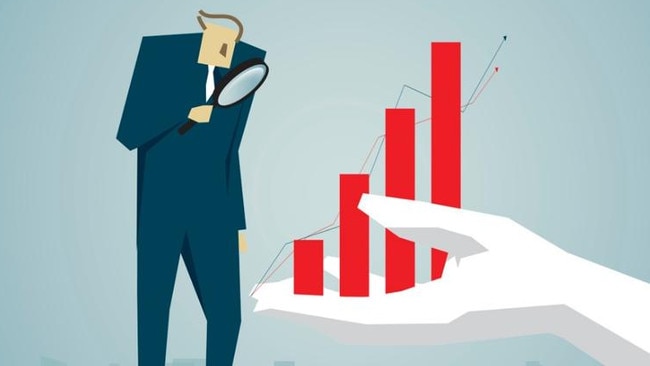Let down by bonds? Private debt’s worth a look
It is an asset class investors, especially those who want income, can no longer afford to ignore.

For all the doom and gloom being proffered by various analysts it might surprise you to learn the Australian economy is actually growing.
And it grew 2.7 per cent over the last year. Sure, the rate of growth might be slowing, but we’re still growing.
And if you consider all the job vacancy signs posted on every second retailer and restaurant window, you’d be forgiven for thinking we’d be growing a lot faster if those positions were filled.
Many Australian businesses – those SMEs representing Australia’s growth engine – could be growing a lot faster if it wasn’t for a lack of staff or capital.
And it’s capital that has been pulled at precisely the time those businesses need it most. Remember, the big banks employ those same strategists and commentators who are worried about recessions.
When banks are worried about recessions, they pull back on lending – producing the very outcome they seek to avoid.
And when banks do lend, they often take longer to approve a loan than the period the business needs the funding.
There’s a remarkable number of businesses needing smaller loans for short periods of time.
I am aware, for example, of a steel fabricator whose customers want so many products he can’t meet demand.
Small, short-term loans to buy the raw material go some of the way to ensuring that business and the economy keeps humming.
Meanwhile, there’s a generation of investors desperate for monthly cash income.
Hurt by a long period of low interest rates, even recent rate rises have done little to produce ideal outcomes for the generation of Australians who want regular income without the volatility associated with the stockmarket.
Conventional wisdom says more mature investors can meet their requirement for income today and the need for long-term growth by blending an investment in shares with an investment in bonds.
In theory, equities provide growth – ultimately ensuring the preservation of purchasing power – while bonds provide the balance through uncorrelated returns and regular income.
The only problem is that bonds haven’t performed as advertised.
When interest rates rise, especially when inflation is rampant, bonds crash right alongside shares.
Investors with a balanced portfolio of, for example, 60 per cent bonds and 40 per cent shares, experience a decline in 100 per cent of their portfolio.
Indeed, UK-based bond brokers Redington recently produced research revealing the negative correlation between equities and bonds, upon which so much retirement money is based, is a more recent phenomenon.
By running an analysis back to 1976, Redington found the longer-term average correlation is actually a positive 0.20.
That means there’s a weak positive relationship between bonds and stocks.
They frequently move in the same direction. Redington also found meaningful periods of positive correlation transpired with times when bonds and equity prices were perfectly aligned. In other words, equities and bonds fall together.
Fundamentally this makes sense. As bond prices fall, their yields rise.
When bond yields rise, the discount rate used to value assets rises too, and like gravity, asset prices are brought down to earth. It’s just the present value of money formula working as it should.
Redington then drilled even deeper, looking at factors such as the level of interest rates, the shape of the yield curve, and the rate of change in inflation to uncover possible explanations for these shifts in regimes, from correlated to uncorrelated equity/bond returns.
What they discovered is that when inflation – averaged over a two-year period – exceeds 4 per cent (that’s where it is now), the correlation between stocks and bonds has never been negative.
Not even once.
In other words, bonds don’t offer any diversification or stability benefits when it’s needed most.
Redington concluded when inflation became persistent rather than transitory, bonds would not provide a haven for investors.
Given the majority of investors have portfolios with stocks and bonds, and bonds aren’t offering diversification, protection or even decent income when inflation ramps up, what’s the alternative?
Well, thanks to fintech-enabled non-bank lenders, investors can now generate higher monthly cash income through an asset class with very little correlation to equities.
And investors can, at the same time, perform the job of a bank – collecting interest from lending capital to businesses that want to, and can, grow faster.
The asset class is called private debt.
Previously the preserve of family offices and wealth investors, all investors can, through a variety of unlisted private debt funds, fill the void left by the banks who have exited corporate lending because it was either too capital or labour-intensive for them.
There are some big players in the space.
Some of those larger players specialise in a few larger corporate loans, while others might be concentrated in a single sector and have a lot of property exposure.
And then there are those, with successful track records over five years (which takes into account the Covid-related crisis), producing monthly cash returns of between 5 and 10 per cent per annum, lending to thousands of borrowers across diverse sectors and industries, and supporting Australia’s growth.
Given the recent disappointment produced by conventional exposure to bonds, and the support it provides to help business grow, you should be hearing a lot more about private debt.
It is an asset class investors, especially those who want income, can no longer afford to ignore.
Roger Montgomery is founder and chief investment manager at Montgomery Investment Management








To join the conversation, please log in. Don't have an account? Register
Join the conversation, you are commenting as Logout